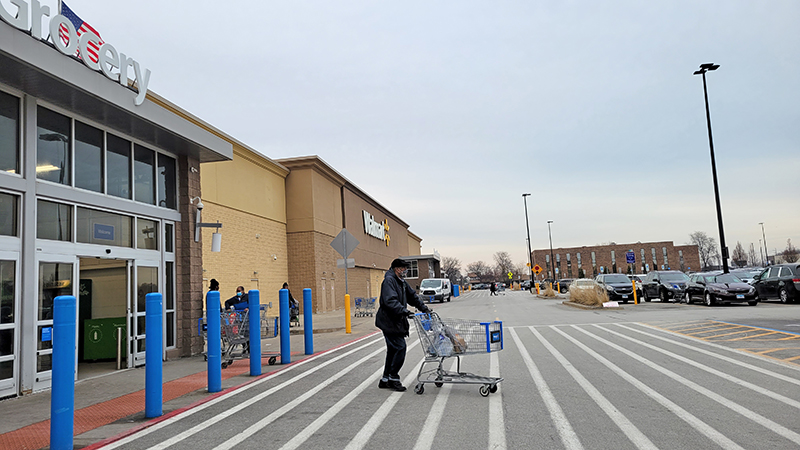Homewood Mayor Rich Hofeld said he was surprised by Walmart’s announcement that it would close its store at 17750 Halsted St. on March 10 because he thought the store was doing very well.
“I wish they had consulted with us ahead of time,” he said. “Were they really aware that a casino was going in a block away? You wonder if those decisions are made in a vacuum.”

The store’s closure will put a dent in the village’s sales tax revenues for a while. Village officials are barred by law from revealing how much sales tax a business pays, but Hofeld said Walmart is among the village’s biggest businesses.
“We’ll take a hit initially and we’ll work our tails off, as we always do, and we’ll get a use in there. We’ll be looking for a sales tax producing use,” he said.
Village Manager Napoleon Haney said the ideal use would hit the “trifecta” of generating property tax, sales tax and places of eating tax in order to best support village services.
Sales tax is the largest single source of revenue for the village’s general fund at 24%. Property tax accounts for about 23% of general fund revenues. The general fund pays for basic village services, including police, fire, public works and administration.
Hofeld and village staff do not intend to dwell on the loss. Instead, they are at work to find a replacement for the retail giant. As soon as he got off the phone with Walmart’s governmental affairs representative, who had conveyed the news about the store’s closure, Hofeld was on the phone with developers.
The village does not control the property, which is owned by Sears Holdings, but Hofeld and Economic Development Director Angela Mesaros can help recruit businesses that would benefit the village and fit the local economy.
“I have my list,” Hofeld said. “I don’t know if they are possible or not. They all have their requirements.”
His wish list includes upscale grocery store Marianos, a sporting goods store, a car dealer, tool store Harbor Freight, Binney’s liquor store or Costco.
“We’ll be fine. We’re a terrific market,” he said. “We’re a very welcoming community. We know how to deal with development. We’ve been successful in the past and we’ll continue to be in the future.”
Village staff noted that Walmart’s move follows a pattern that has played out in the area over the past few years.
In 2016, the company closed its store in Matteson and opened a new store in nearby Richton Park. In 2018, the store closed its Sam’s Club in Matteson.
In 2015, the company closed a store in Calumet City and opened a new one in Lansing, about a mile away.
And in 2016, Walmart closed its store in Glenwood and opened the Homewood store two miles north on the same street.
In an unusual move, Homewood offered to share a portion of its sales tax revenue with Glenwood for three years. In 2017 through 2019, Homewood provided 10% of the sales tax generated by the Walmart store to Glenwood.
“It was about being a good neighbor,” Hofeld said. “I would do that again today.”
Homewood staff put together a timeline for developments on the property where the Walmart store is now, starting with a fire that destroyed the Washington Park racetrack in February 1977.
In 1986, the village established a tax increment financing district to spur economic activity on the site. The TIF district was in place until it expired in 2009.
In 1992, a Super Kmart was built on the site. That store, in another big box store shuffle, moved from its original Homewood location on west 183rd Street. Eventually, the old Kmart building became home to Brunswick Zone, which closed in 2015, and Big Lots, which relocated to Country Club Hills in 2022.
The Super Kmart closed in 2013, and the store was vacant until Walmart leased and remodeled it in 2015-16.
Homewood’s elected officials and some residents did not welcome the store with open arms when it announced it would be coming to town. The village board rebuffed several requests for incentives, but eventually agreed to support a county Class 8 property tax relief benefit with a $4.3 million cap. Staff and trustees at the time said the company threatened to leave the store vacant for two decades if it did not receive the Class 8 designation, although company officials at the board meeting denied the company would do that.
Then-Trustee Anne Colton cited that tactic and the company’s reputation for moving into communities for a few years then moving on as reasons she voted against the Class 8 designation. The rest of the board voted in favor but none of them expressed support for the project.
At stake was not only the sales tax the store would generate but a better property tax rate. Although the Class 8 benefit lowers property taxes from 25% of assessed valuation to 10%, the property would have been assessed an even lower rate if left vacant.
Colton, who stepped off the board in 2018, is seeking to return to the board in the April 4 election.


